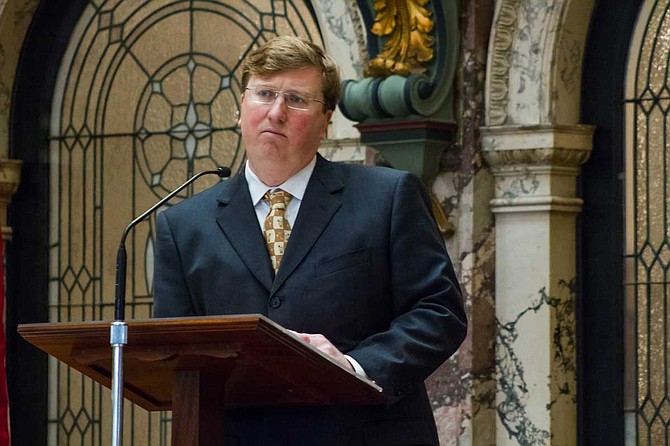Gov. Tate Reeves and state House leaders are pushing separate proposals to substantially change Mississippi tax laws. Photo by Stephen Wilson
When then-Gov. William Winter wanted to make substantial changes to Mississippi's education system in the early 1980s, he and his staff spent months building support for their proposals.
They traveled the state, held hearings and leveraged the power of public opinion to persuade recalcitrant legislators to adopt the Education Reform Act of 1982. The law set compulsory attendance rules, created public kindergarten and set quality standards.
That kind of effort to build support outside the Capitol is not happening now as Gov. Tate Reeves and state House leaders push separate proposals to substantially change Mississippi tax laws.
Reeves wants to phase out Mississippi's personal income tax. House Speaker Philip Gunn and his top allies in the Republican-controlled chamber rolled out a complex plan last week to increase some taxes and decrease others.
Gunn has been in the House since January 2004, and he said the tax package would be the most historic policy change during his legislative career.
“I think this is a day that all Mississippians can look to as a red-letter day,” Gunn said during a news conference Tuesday at the Capitol.
The House leaders' plan would phase out the personal income tax and cut the 7% grocery tax in half over several years. It would also increase several other taxes, including the state sales tax on most items, which would go from the current 7% to 9.5%. Tax rates would increase on items including cars and trucks, cigarettes, alcohol, farm equipment and manufacturing equipment.
House leaders introduced their tax overhaul proposal on Feb. 22 as House Bill 1439 — more than 300 pages that do not lend themselves to speed reading. They pushed it through the Ways and Means Committee the same day. And they pushed it through the House on an 85-34 vote the next day, with 72 votes needed to pass. It was mostly a partisan split, but a few Democrats voted for the bill and one Republican opposed it.
The bill did not include a “fiscal note” to outline the impact the proposed changes could have on the state budget. A fiscal note is a basic expectation; legislators in the past have balked at voting on bills without them.
Reeves mentioned his wish to phase out the income tax in November, when he released his budget proposals for the year that will begin July 1. He touched on it again during his State of the State address in January.
The coronavirus pandemic makes this a bad time for Reeves to barnstorm the state and push his tax proposal, because the governor himself has limited the size of indoor gatherings to curb the spread of the virus. Reeves, though, has not been making other high-profile efforts to generate public support for his proposal.
During Mississippi’s budget year that ended June 30, the state collected about $5.8 billion from all types of state taxes, fees and other sources, including lawsuit settlements, according to the state Department of Finance and Administration. The biggest chunk of money, about $2.2 billion, came from sales taxes. The next-largest source was about $1.8 billion from individual income taxes.
Republican Lt. Gov. Delbert Hosemann presides over the 52-member Senate. Speaking to reporters in December, he made clear that he was not on board with the governor's proposal.
“We’re not going to go through a process of eliminating the ability of people to get educated, just for a talking point,” Hosemann said.
Reeves last week criticized the House proposal, saying: “I certainly wouldn’t want to be a Republican who votes to significantly increase taxes for certain segments of the general public."
Winter was a Democrat dealing with a Democratic-controlled Legislature. He worked to build public support for the Education Reform Act because the party was not a monolith.
Reeves is a Republican dealing with a Republican-controlled Legislature. The GOP holds more than the three-fifths supermajority needed to increase or decrease tax rates. But the party is not a monolith, and leaders could have trouble uniting enough legislators behind a tax overhaul unless they take time to engage the public and build widespread support.



Comments
Use the comment form below to begin a discussion about this content.